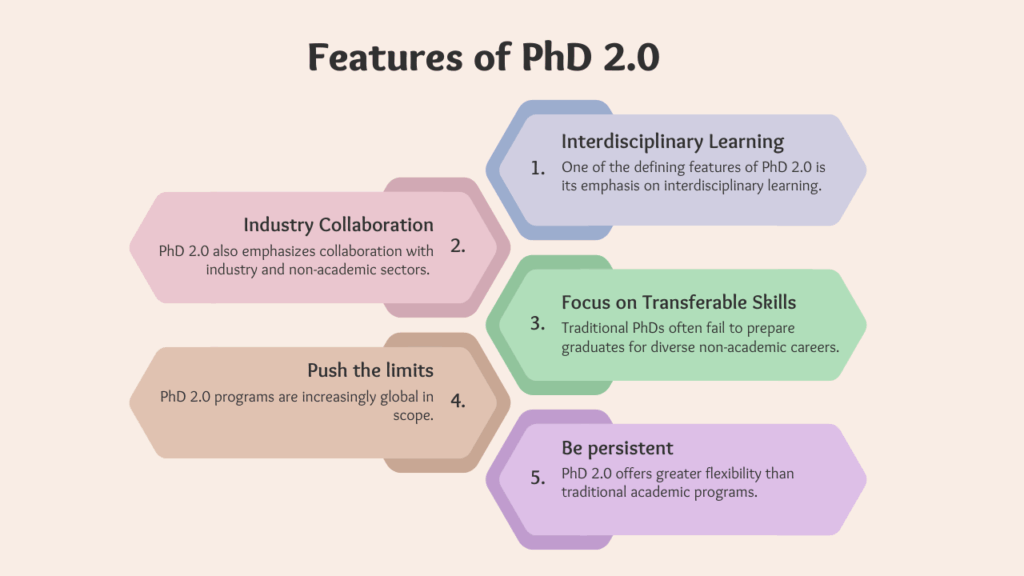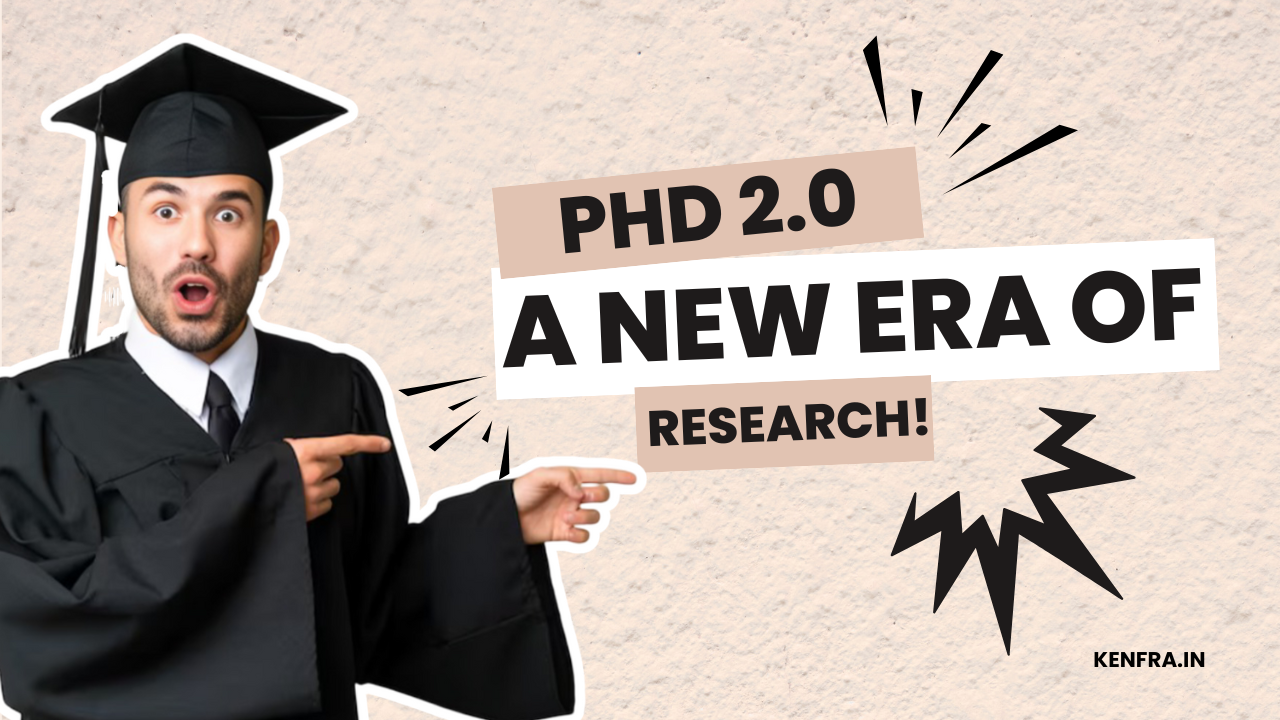What is PhD 2.0? Your Complete Guide to the Modern Research Degree
Kenfra Research - Bavithra2025-11-14T17:12:35+05:30The world of higher education is evolving rapidly, and the traditional PhD model is no exception. Welcome to the next generation of the modern research degree that’s designed to equip students with a broader skill set for the modern world. Whether you’re considering pursuing a PhD or already enrolled, this guide will walk you through what modern PhD is, how it’s different from traditional PhD programs, and why it’s relevant in today’s research and professional landscapes.
What Is PhD 2.0?
PhD 2.0 is a modern PhD approach. It’s different from the traditional PhD because it focuses not just on academic research, but also on skills that can be used in real-world jobs. While traditional PhDs often focus mainly on research and teaching, it encourages students to learn from different fields, solve practical problems, and build skills that are useful in many industries, including business, government, and technology.
In simple terms, it is a more flexible, well-rounded program that prepares students for a variety of careers, not just in universities. It’s designed to help students adapt to the changing world, where research needs to connect with real-world issues and industries.
Key Features of PhD 2.0

1. Interdisciplinary Learning
One of the defining features of modern PhD is its emphasis on interdisciplinary learning. Researchers are encouraged to explore a range of fields, allowing them to apply new techniques and perspectives to their work. Whether it’s combining engineering with environmental science or blending social sciences with technology, interdisciplinary research is seen as essential for addressing the complex problems of the modern world.
2. Industry Collaboration
This modern PhD also emphasizes collaboration with industry and non-academic sectors. Universities now partner with private companies, research institutions, and government agencies to give PhD students exposure to real-world challenges. These partnerships provide access to resources, data, and networks that can accelerate the pace of research and innovation.
3. Focus on Transferable Skills
Traditional PhD programs have often been criticized for not preparing graduates for careers outside academia. 2.0 programs aim to fix this by including training in transferable skills such as project management, communication, leadership, and entrepreneurship. These skills are essential for those looking to work in non-academic settings, such as industry, policy-making, and non-profit organizations.
4. Global Perspective
The modern PhD programs are increasingly global in scope. Many programs offer opportunities for international research collaborations, exchange programs, and virtual projects. The globalized nature of research today demands that PhD students develop an understanding of global challenges and the ability to work in diverse environments.
5. Flexible Learning Paths
Unlike traditional PhDs, which can often follow a rigid academic path, PhD 2.0 offers greater flexibility. Students can design their own research agendas, collaborate with diverse experts, and integrate various learning methodologies. This flexibility allows students to shape their doctoral experience to fit their unique career aspirations.
Benefits of PhD 2.0
1. Career Opportunities Beyond Academia
While traditional PhDs have often limited graduates to academic careers, it opens up a variety of career pathways. Graduates are well-prepared for roles in research and development, policy analysis, consulting, and management in both the private and public sectors. Their well-rounded skill sets make them highly valuable to employers.
2. Enhanced Research Impact
It encourages students to engage with stakeholders beyond the university, ensuring that their research has a real-world impact. By collaborating with industry professionals and applying research to practical problems, graduates can see their work translate into tangible solutions.
3. Networking Opportunities
With its emphasis on industry collaboration and global research initiatives, it offers expanded networking opportunities. Students have the chance to work alongside professionals from diverse fields, leading to valuable connections that can support their career development.
4. Increased Work-Life Balance
Many programs are designed to be more flexible, offering online courses, part-time options, and a more self-directed approach. This flexibility helps students maintain a healthier work-life balance, which is often a challenge in traditional PhD programs.
Challenges of PhD 2.0
While 2.0 has many advantages, it does come with some challenges:
- Higher Expectations
Since you’re expected to balance research with other skills, such as industry collaboration or public speaking, the demands can be higher than a traditional PhD. You’ll need to manage your time well and be comfortable with multiple tasks. - Less Structure
Traditional PhDs often have clear, set paths and timelines. With 2.0, the journey can be more flexible, which might be difficult for some people. You’ll need to be more self-disciplined and proactive to stay on track. - Pressure to Commercialize
Many students collaborate with businesses, and this sometimes leads to pressure to turn research into a product or business idea. While this is great for career opportunities, it can also add stress, especially if your focus is purely academic.
Is PhD 2.0 Right for You?
2.0 may be a great fit for you if:
- You’re interested in interdisciplinary research and tackling complex, real-world problems.
- You want to gain experience and skills that are applicable in both academic and non-academic settings.
- You’re interested in working with industry partners or government agencies.
- You prefer a flexible learning environment with a focus on personal development and career readiness.
It’s important to note that not all PhD programs are PhD 2.0 programs. When considering a PhD, make sure to research the specific offerings of the institution to ensure they align with your goals.

Conclusion
PhD 2.0 is the future of doctoral education, designed to prepare students for the dynamic, interconnected world of research, technology, and industry. By embracing interdisciplinary collaboration, practical skills, and industry partnerships, ensures that graduates are well-equipped for a wide range of career opportunities. At Kenfra Research, we offer complete PhD support from topic selection to thesis submission with expert guidance and reliable academic assistance throughout your research journey.
Frequently Asked Questions (FAQs)
1. What is the difference between a traditional PhD and PhD 2.0?
A traditional PhD focuses on research and teaching, while PhD 2.0 adds industry skills and broader career preparation.
2. Can I get a job in industry with a PhD 2.0?
Yes! PhD 2.0 grads are in high demand in industries like R&D, consulting, policy, and data science because of their diverse skills.
3. Is PhD 2.0 suitable for all fields of study?
PhD 2.0 is particularly beneficial for fields with interdisciplinary research or industry links, such as technology, healthcare, and environmental science.
4. Can I pursue a PhD 2.0 part-time or online?
Yes, many universities now offer flexible PhD 2.0 programs, including part-time and online options, to accommodate the diverse needs of students.





Leave a Reply